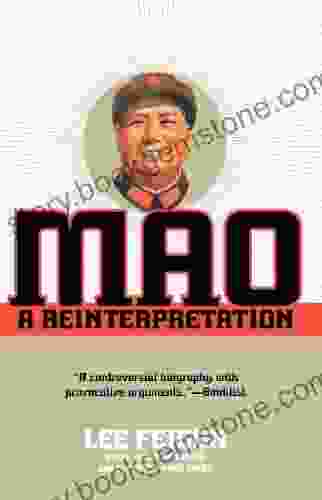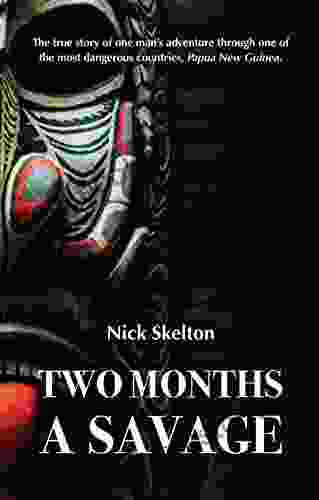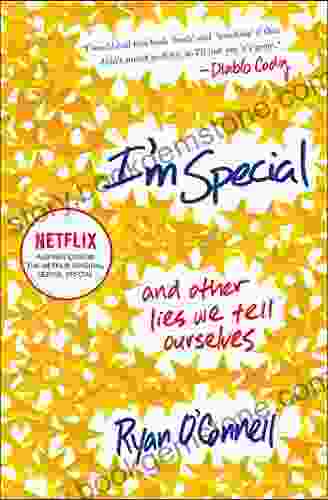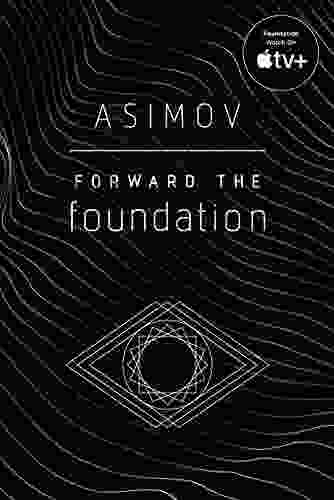Reinterpretation of Mao: Lee Feigon's Revolutionary Work

Lee Feigon's reinterpretation of Mao Zedong's revolutionary legacy has ignited a profound shift in our comprehension of Chinese history. His ground-breaking scholarship has challenged conventional narratives, pioneering new avenues of inquiry into the nature of Chinese communism and its global implications. This article examines the transformative impact of Feigon's work, analyzing its contributions to both the study of Chinese history and the broader historical research landscape.
4.6 out of 5
| Language | : | English |
| File size | : | 1292 KB |
| Text-to-Speech | : | Enabled |
| Screen Reader | : | Supported |
| Enhanced typesetting | : | Enabled |
| Word Wise | : | Enabled |
| Print length | : | 238 pages |
Challenging Traditional Views of Mao and Chinese Communism
Feigon's work stands out for its rigorous critique of traditional interpretations of Mao and Chinese communism. He argues that earlier scholarship often presented a simplistic and distorted view of Mao as a monolithic figure, overlooking the complexities and nuances of his thought and actions.
In contrast, Feigon presents a more nuanced and multifaceted portrait of Mao, emphasizing the dynamic interplay between his personal experiences, ideology, and the evolving political landscape. He demonstrates how Mao's ideas and strategies were deeply influenced by the specific conditions of China in the early 20th century, particularly the challenges of war, poverty, and imperialism.
Decentering Mao: The Role of the Chinese People
One of the most significant contributions of Feigon's work is its emphasis on the agency of the Chinese people in the revolutionary process. He rejects the notion that Mao was the sole driving force behind the Chinese Revolution, arguing instead that the revolution was a collective achievement of the Chinese masses.
Feigon meticulously documents the active participation of ordinary Chinese citizens in shaping the course of the revolution. He highlights the role of peasants, workers, women, and intellectuals in mobilizing support for the Communist Party and implementing its policies. By decentering Mao from the revolutionary narrative, Feigon underscores the importance of popular agency and collective action in historical change.
Reevaluating Mao's Lasting Impact
Feigon's reinterpretation extends beyond Mao's lifetime, examining the enduring legacy of his thought and policies on Chinese society. He argues that Mao's impact was both positive and negative, leaving a complex and multifaceted imprint on China's modern history.
While acknowledging Mao's successes in mobilizing the masses and initiating land reforms, Feigon also critically examines the disastrous consequences of the Great Leap Forward and the Cultural Revolution. He contends that these campaigns resulted in widespread suffering and setbacks for China's development.
Feigon's balanced analysis of Mao's legacy provides a more nuanced understanding of his impact, avoiding both hagiography and demonization. He invites us to grapple with the complexities of a historical figure who simultaneously achieved remarkable victories and presided over profound tragedies.
Implications for the Study of Chinese History
Feigon's reinterpretation of Mao has far-reaching implications for the study of Chinese history. His work has inspired a new generation of scholars to reexamine traditional narratives and question long-held assumptions about the Chinese Revolution and its aftermath.
Feigon's emphasis on the agency of the Chinese people has encouraged historians to investigate the grassroots movements and everyday experiences that shaped China's transformation. This broader perspective has led to a more inclusive and comprehensive understanding of Chinese history.
Moreover, Feigon's work has stimulated a critical reassessment of the role of ideology in Chinese communism. By exploring the ways in which Mao's thought interacted with Chinese culture and society, scholars have gained a deeper understanding of the complexities of revolutionary ideology and its impact on historical events.
Extending the Boundaries of Historical Research
Beyond its significance for the study of Chinese history, Feigon's reinterpretation of Mao has broader implications for historical research in general. His work demonstrates the importance of questioning established narratives and exploring alternative perspectives.
Feigon's rigorous methodology, combining archival research, interviews, and a deep understanding of Chinese culture, exemplifies the highest standards of historical inquiry. His ability to synthesize disparate sources and construct a coherent and persuasive narrative serves as a model for historians working in other fields.
Furthermore, Feigon's work challenges us to reconsider the boundaries of historical research. By examining the role of ordinary people in shaping history and by exploring the complex interactions between ideology and society, he has expanded our understanding of what constitutes historical significance.
Lee Feigon's reinterpretation of Mao Zedong's revolutionary legacy has been transformative for the study of Chinese history and beyond. His work has challenged conventional narratives, decentered Mao from the historical stage, and emphasized the agency of the Chinese people. Feigon's rigorous scholarship and incisive analysis have not only shed new light on China's past but also extended the boundaries of historical research.
As future generations grapple with the complexities of China's rise and its place in the global order, the insights provided by Feigon's work will continue to inspire and inform historical inquiry.
4.6 out of 5
| Language | : | English |
| File size | : | 1292 KB |
| Text-to-Speech | : | Enabled |
| Screen Reader | : | Supported |
| Enhanced typesetting | : | Enabled |
| Word Wise | : | Enabled |
| Print length | : | 238 pages |
Do you want to contribute by writing guest posts on this blog?
Please contact us and send us a resume of previous articles that you have written.
 Best Book
Best Book Page Flip
Page Flip Bookshelf
Bookshelf Literary loom
Literary loom Chapter
Chapter Bookish
Bookish PageTurner
PageTurner Bibliophile
Bibliophile Story
Story Inkwell
Inkwell Bookworm
Bookworm Labyrinth
Labyrinth Plot Twist
Plot Twist Prose
Prose Paperback
Paperback Storyteller
Storyteller Sanctuary
Sanctuary Fiction
Fiction Reading
Reading Chronicle
Chronicle Read
Read Scott Rigsby
Scott Rigsby Richard Dunlop
Richard Dunlop Yahrah St John
Yahrah St John Mina Carter
Mina Carter Katherine Baber
Katherine Baber Logan Jacobs
Logan Jacobs Sofie Roach
Sofie Roach Ross Feld
Ross Feld Q David Bowers
Q David Bowers Mark Dawson
Mark Dawson Jasmine Mans
Jasmine Mans Ben Macintyre
Ben Macintyre Lola Dodge
Lola Dodge G Bruce Boyer
G Bruce Boyer Josie Lewis
Josie Lewis Loren Moss
Loren Moss Rob Smyth
Rob Smyth Sy Montgomery
Sy Montgomery Joseph Delaney
Joseph Delaney Wendy Bellion
Wendy Bellion Mary Mccarthy
Mary Mccarthy Ann Petry
Ann Petry John Scalzi
John Scalzi Stephen Jones
Stephen Jones Eva Priest
Eva Priest Samantha Ford
Samantha Ford G K Chesterton
G K Chesterton Oliver Kent
Oliver Kent Frank Herbert
Frank Herbert Mark Harris
Mark Harris Zohara Hirji
Zohara Hirji Francisco Martin Rayo
Francisco Martin Rayo Maya Angelou
Maya Angelou Weina Dai Randel
Weina Dai Randel Keah Brown
Keah Brown Lisa Gardner
Lisa Gardner Dirk Walvoord
Dirk Walvoord Philip Caputo
Philip Caputo J L Witterick
J L Witterick Jade Spark
Jade Spark Laureen Jordan
Laureen Jordan Sandy Allnock
Sandy Allnock Erin H Turner
Erin H Turner Christian Kallias
Christian Kallias Jason Anspach
Jason Anspach Robert Bailey
Robert Bailey S A Chakraborty
S A Chakraborty Lorraine Hansberry
Lorraine Hansberry Eungjun Min
Eungjun Min Lee Hammond
Lee Hammond Orin Starn
Orin Starn Frederick Harris
Frederick Harris John W Morehead
John W Morehead Scott Shupe
Scott Shupe Sunny Hostin
Sunny Hostin Wes D Gehring
Wes D Gehring Mark Hillary
Mark Hillary Tiece
Tiece Jeanie Tsui
Jeanie Tsui G Costa
G Costa Ryan O Connell
Ryan O Connell Emma Sky
Emma Sky Jennifer 8 Lee
Jennifer 8 Lee Kellee L Greene
Kellee L Greene Kathleen E Woodiwiss
Kathleen E Woodiwiss Ernie Jr Johnson
Ernie Jr Johnson Yvon Chatelin
Yvon Chatelin William F Stark
William F Stark Julia Emma
Julia Emma Jennifer Smith Turner
Jennifer Smith Turner Ted Andrews
Ted Andrews Enrique Zaldivar
Enrique Zaldivar Michael Moran
Michael Moran Nathaniel Schiffman
Nathaniel Schiffman Bill Fawcett
Bill Fawcett Eshaan Sombhatta
Eshaan Sombhatta Jo B Paoletti
Jo B Paoletti Jeff Burgess
Jeff Burgess Stacey Abrams
Stacey Abrams Joe Kane
Joe Kane Lynnea Lee
Lynnea Lee Robert C Wood
Robert C Wood John Alexander
John Alexander Belle Calhoune
Belle Calhoune Isaac Asimov
Isaac Asimov Patty Krawec
Patty Krawec Sibylla Nash
Sibylla Nash Timm Mains
Timm Mains John P Murphy
John P Murphy Zane
Zane Victoria Finlay
Victoria Finlay Niobia Bryant
Niobia Bryant Randy Welborn
Randy Welborn Frances Stonor Saunders
Frances Stonor Saunders Jerome Preisler
Jerome Preisler Sandro Jung
Sandro Jung Wilson Harvey
Wilson Harvey Drew Karpyshyn
Drew Karpyshyn Operation Alpha
Operation Alpha Jessie Redmon Fauset
Jessie Redmon Fauset Nancy Sharon Collins
Nancy Sharon Collins Clark Norton
Clark Norton Glenn Dakin
Glenn Dakin Kunal Verma
Kunal Verma James Caskey
James Caskey Marie Benedict
Marie Benedict Tom Nichols
Tom Nichols Misty M Beller
Misty M Beller Veronica Winters
Veronica Winters Jessica Gadziala
Jessica Gadziala Lynda Lopez
Lynda Lopez Ernst Pawel
Ernst Pawel Lawrence Chui
Lawrence Chui Jeff Pearlman
Jeff Pearlman Michelle Holder
Michelle Holder Endiya Carter
Endiya Carter Evelio Grillo
Evelio Grillo Gladys Malvern
Gladys Malvern Explore Towin
Explore Towin Neil Clarke
Neil Clarke Matthew Farrer
Matthew Farrer Mike Kraus
Mike Kraus Kelly Hodge
Kelly Hodge Jeanne Howard
Jeanne Howard Nathan Hystad
Nathan Hystad Patricia Briggs
Patricia Briggs Lindsey Tramuta
Lindsey Tramuta Kent Blansett
Kent Blansett Uri Dan
Uri Dan Bruce Sterling
Bruce Sterling Fiona Davis
Fiona Davis Lauren Collins
Lauren Collins Guy Austin
Guy Austin Steven Brust
Steven Brust Douglas Phillips
Douglas Phillips Fodor S Travel Guides
Fodor S Travel Guides Zenna Henderson
Zenna Henderson Gavin Strange
Gavin Strange Ernestine Hayes
Ernestine Hayes Matthew Palmer
Matthew Palmer Melanie Cambridge
Melanie Cambridge Katrien Van Der Schueren
Katrien Van Der Schueren Steven M Barrett
Steven M Barrett Sapphire
Sapphire Neal Gabler
Neal Gabler John Walker
John Walker Selwyn Leamy
Selwyn Leamy T F Rhoden
T F Rhoden Francesco Careri
Francesco Careri Eyal Davidson
Eyal Davidson Jan Moran
Jan Moran Ronnie Lipton
Ronnie Lipton Marc Uwe Kling
Marc Uwe Kling Jimmy Santiago Baca
Jimmy Santiago Baca Ursula Bacon
Ursula Bacon Sharlene Rendle
Sharlene Rendle Michael F Kastre
Michael F Kastre Keisha Quallo
Keisha Quallo Graeme I
Graeme I Frederick Douglass
Frederick Douglass Mary Monroe
Mary Monroe Geoffrey Ball
Geoffrey Ball R A Nargi
R A Nargi Justin Sloan
Justin Sloan Dennis Vanderkerken
Dennis Vanderkerken Mike Bockoven
Mike Bockoven Stanley Meisler
Stanley Meisler Matthew Morgante
Matthew Morgante Jennifer Higgie
Jennifer Higgie Nick Kyme
Nick Kyme Susan Sontag
Susan Sontag Lewis Grassic Gibbon
Lewis Grassic Gibbon Linda Birch
Linda Birch Dawn C Crouch
Dawn C Crouch Justin Merm
Justin Merm John Hundley
John Hundley Tom Sancton
Tom Sancton Laurie Mcandish King
Laurie Mcandish King Ree Drummond
Ree Drummond Terry Goodkind
Terry Goodkind F Knight
F Knight Henry W Simon
Henry W Simon Tu Ilape Vimahi
Tu Ilape Vimahi Sharon Swift
Sharon Swift M R Green
M R Green Henri J M Nouwen
Henri J M Nouwen Eric Walters
Eric Walters Ted Loukes
Ted Loukes Regina Louise
Regina Louise John Williams
John Williams Lily King
Lily King Leilehua Yuen
Leilehua Yuen Thota Ramesh
Thota Ramesh Linda Kemp
Linda Kemp Keith Svagerko
Keith Svagerko Michael Mcgarrity
Michael Mcgarrity Henry Adams
Henry Adams Deborah Solomon
Deborah Solomon Jerry Yarnell
Jerry Yarnell Georgina Shorter
Georgina Shorter Jo Tatchell
Jo Tatchell Erika B
Erika B Evelyn Gallardo
Evelyn Gallardo Marion Amberg
Marion Amberg Esther Jungreis
Esther Jungreis Ferrett Steinmetz
Ferrett Steinmetz Mary Vaughan
Mary Vaughan Harry Thurston
Harry Thurston Boze Hadleigh
Boze Hadleigh Martin Gitlin
Martin Gitlin Mark Horrell
Mark Horrell Ilene Beckerman
Ilene Beckerman Mayte Garcia
Mayte Garcia Eric Shanes
Eric Shanes Enrico Massetti
Enrico Massetti L Ron Hubbard
L Ron Hubbard Susan Britt Gallagher
Susan Britt Gallagher Richard Fife
Richard Fife Michael Siebenbrodt
Michael Siebenbrodt Farah Bidin
Farah Bidin Debra Gwartney
Debra Gwartney J M Calverley
J M Calverley Nicholas Mirzoeff
Nicholas Mirzoeff H G Wells
H G Wells Kelly Wiese
Kelly Wiese Michael C Sturman
Michael C Sturman Laura Reiter
Laura Reiter Curt Warner
Curt Warner Kennedy Odede
Kennedy Odede Paula Reed
Paula Reed Jim Krause
Jim Krause George Allen Durkee
George Allen Durkee Stephen M Silverman
Stephen M Silverman Johann Wolfgang Von Goethe
Johann Wolfgang Von Goethe Frederick Forsyth
Frederick Forsyth Suze Solari
Suze Solari L X Beckett
L X Beckett Sheryl Sandberg
Sheryl Sandberg Jennifer Visocky O Grady
Jennifer Visocky O Grady Jo Spain
Jo Spain Shirley Blancke
Shirley Blancke Eric Franklin
Eric Franklin Scott Waddle
Scott Waddle Zaina Brown
Zaina Brown Laura Sherman
Laura Sherman Frank Gado
Frank Gado Maria Augusta Trapp
Maria Augusta Trapp John Mcphee
John Mcphee Karl Iglesias
Karl Iglesias David B Levy
David B Levy Carolyn Brown
Carolyn Brown Julian Aguon
Julian Aguon Putsata Reang
Putsata Reang Jami Attenberg
Jami Attenberg Jaleen Grove
Jaleen Grove Johnson Cheu
Johnson Cheu Flora Miller Biddle
Flora Miller Biddle Mahealani Uchiyama
Mahealani Uchiyama Frances Kiernan
Frances Kiernan Tipu Khan
Tipu Khan Jonathan Kellerman
Jonathan Kellerman Paul Allain
Paul Allain Ian Warrell
Ian Warrell Fiona Peart
Fiona Peart John Baxter
John Baxter Eve Vaughn
Eve Vaughn Sally Mott Freeman
Sally Mott Freeman Hugh Howey
Hugh Howey Martyn Clifford
Martyn Clifford Eugene Robinson
Eugene Robinson Sydney Ladensohn Stern
Sydney Ladensohn Stern Paul Bowles
Paul Bowles Maureen Callahan
Maureen Callahan Jo Charnock
Jo Charnock Roma Ligocka
Roma Ligocka S M Anderson
S M Anderson Diane Greenberg
Diane Greenberg Brenda Jackson
Brenda Jackson J Donald Walters
J Donald Walters Barbara Lewis
Barbara Lewis Tim Leong
Tim Leong Yelena Lembersky
Yelena Lembersky Karl Fulves
Karl Fulves Renee D Aoust
Renee D Aoust Eva Mozes Kor
Eva Mozes Kor Kara Tatelbaum
Kara Tatelbaum Quan Millz
Quan Millz Johnnie Gentle
Johnnie Gentle Philip Donlay
Philip Donlay Jerry Minchey
Jerry Minchey Groucho Marx
Groucho Marx Valerie Van Ballaer
Valerie Van Ballaer Fred S Kleiner
Fred S Kleiner Brittney Brooke
Brittney Brooke Jeff Yang
Jeff Yang Sharon C Cooper
Sharon C Cooper Karen Haller
Karen Haller Mia Black
Mia Black Elaine Lui
Elaine Lui Jay Parini
Jay Parini Karen Telling
Karen Telling Manny Khoshbin
Manny Khoshbin Leslie Frontz
Leslie Frontz Klaus Carl
Klaus Carl Luke Waterson
Luke Waterson Rachel Trethewey
Rachel Trethewey Torey L Hayden
Torey L Hayden R Coxton
R Coxton Ros Per
Ros Per Florence Scovel Shinn
Florence Scovel Shinn Maria Tallchief
Maria Tallchief Eric Larson
Eric Larson Mark Rice
Mark Rice Karen Brooks Hopkins
Karen Brooks Hopkins Carol Jenkins
Carol Jenkins James Woodford
James Woodford Jeremy Asher Dauber
Jeremy Asher Dauber Georgina Pazcoguin
Georgina Pazcoguin Harry Ritter
Harry Ritter Tom Blakemore
Tom Blakemore Stefan C Reif
Stefan C Reif Steven Heller
Steven Heller Jerry Remy
Jerry Remy Oliver Sin
Oliver Sin Marcus Sloss
Marcus Sloss Sandra Rendgen
Sandra Rendgen Francisco Goya
Francisco Goya Richard Phillips
Richard Phillips Georgia Hunter
Georgia Hunter Franz Sales Meyer
Franz Sales Meyer Will Gompertz
Will Gompertz Frederik Pohl
Frederik Pohl Henry Kuttner
Henry Kuttner Tom Piazza
Tom Piazza Eric Wiberg
Eric Wiberg Vicki Andree
Vicki Andree Gene Roddenberry
Gene Roddenberry Margaret Aycock
Margaret Aycock Rita Naomi Moran
Rita Naomi Moran Rachael Chastain
Rachael Chastain Jess Grippo
Jess Grippo Eric Foner
Eric Foner Frank Babb
Frank Babb Michael Eric Dyson
Michael Eric Dyson Rebekah Taussig
Rebekah Taussig Nicholas Crouch
Nicholas Crouch Rudolf Steiner
Rudolf Steiner Kate Spade New York
Kate Spade New York Evan Winter
Evan Winter Seyyed Hossein Nasr
Seyyed Hossein Nasr Max Anderson
Max Anderson Lee Feigon
Lee Feigon Matthew Baxter
Matthew Baxter Russell Means
Russell Means Sophie Stern
Sophie Stern Jessica Mack
Jessica Mack Jayne Wark
Jayne Wark E J Fleming
E J Fleming Nicole R Fleetwood
Nicole R Fleetwood Jacob Broschart
Jacob Broschart Jody Eddy
Jody Eddy Joseph D Addetta
Joseph D Addetta Ruth E Iskin
Ruth E Iskin Simon Winchester
Simon Winchester Fred M Grandinetti
Fred M Grandinetti Simran Bansal
Simran Bansal Gabe Fajuri
Gabe Fajuri Peter Schjeldahl
Peter Schjeldahl Leticia Sansores
Leticia Sansores Ruby Boukabou
Ruby Boukabou Ian Mcewan
Ian Mcewan Stephanie Pui Mun Law
Stephanie Pui Mun Law Paul D Marks
Paul D Marks Revised Edition Kindle Edition
Revised Edition Kindle Edition Eric Karjaluoto
Eric Karjaluoto Kenyatta Kelechi
Kenyatta Kelechi John Tateishi
John Tateishi Ken Hultgren
Ken Hultgren Tim O Brien
Tim O Brien Tracey Eaton
Tracey Eaton Lucy Vine
Lucy Vine Sandy Alvarez
Sandy Alvarez F B Heald
F B Heald Steven Derosa
Steven Derosa James Craig
James Craig Rainer Maria Rilke
Rainer Maria Rilke Florian Illies
Florian Illies Erin Meads
Erin Meads Stephen Bucaro
Stephen Bucaro Hugh Pendexter
Hugh Pendexter Jennet Conant
Jennet Conant Gulbahar Haitiwaji
Gulbahar Haitiwaji Leisa Rundquist
Leisa Rundquist Joe Hammond
Joe Hammond Ta Nehisi Coates
Ta Nehisi Coates Miles Orvell
Miles Orvell Ocean Vuong
Ocean Vuong F Scott Fitzgerald
F Scott Fitzgerald Jayne Rylon
Jayne Rylon William J Conaway
William J Conaway Will Lutwick
Will Lutwick Sara King
Sara King Mark Crilley
Mark Crilley Susan Mallery
Susan Mallery S K Dunstall
S K Dunstall Robert Hardman
Robert Hardman Susan Mahalick
Susan Mahalick Edward Brody
Edward Brody Mark Padilla
Mark Padilla T R Napper
T R Napper Meniere Man
Meniere Man Hashim Akib
Hashim Akib Fania E Davis
Fania E Davis Eric Thomson
Eric Thomson Fernand Braudel
Fernand Braudel Gris Grimly
Gris Grimly Melissa Hart
Melissa Hart Lisa Napoli
Lisa Napoli Frank Argote Freyre
Frank Argote Freyre Erin French
Erin French Jamie Mcfarlane
Jamie Mcfarlane Wesley Granberg Michaelson
Wesley Granberg Michaelson Martin Ony
Martin Ony Susan Nathan
Susan Nathan Richard Sale
Richard Sale Shoba Narayan
Shoba Narayan Richard Rodriguez
Richard Rodriguez John Marshall
John Marshall Jane Dempster Smith
Jane Dempster Smith Shari Blaukopf
Shari Blaukopf Raiford Guins
Raiford Guins Jacques Maritain
Jacques Maritain John Rechy
John Rechy Belinda Austin
Belinda Austin Emma Gift
Emma Gift Mark Wayne Mcginnis
Mark Wayne Mcginnis Lee Hadan
Lee Hadan Brandon Q Morris
Brandon Q Morris Kevin Collamore Braun
Kevin Collamore Braun Eva Ibbotson
Eva Ibbotson Richard Killeen
Richard Killeen Tish Jett
Tish Jett Jericho Brown
Jericho Brown Ray Balkwill
Ray Balkwill Sir Richard Francis Burton
Sir Richard Francis Burton Fredric Brown
Fredric Brown Quang Van Nguyen
Quang Van Nguyen John Cage
John Cage Richard Walter
Richard Walter Peter Max
Peter Max Kevina Hopkins
Kevina Hopkins Lynn F Forney
Lynn F Forney Chanrithy Him
Chanrithy Him Nicole Seymour
Nicole Seymour Jay Scarfone
Jay Scarfone Matt Forster
Matt Forster Ramin Zahed
Ramin Zahed Ian Usher
Ian Usher Nice Leng Ete
Nice Leng Ete Pui Che
Pui Che Vanessa R Sasson
Vanessa R Sasson Judith Yates
Judith Yates Leslie J Sherrod
Leslie J Sherrod Frank Vlastnik
Frank Vlastnik Chris Enss
Chris Enss Vaclav Havel
Vaclav Havel Alejandro Dujovne
Alejandro Dujovne Farrah Rochon
Farrah Rochon Jerry Stahl
Jerry Stahl Michael N Marcus
Michael N Marcus Walter Foster Creative Team
Walter Foster Creative Team Funmi Fetto
Funmi Fetto Matthew W Sanford
Matthew W Sanford Stephen Laskevitch
Stephen Laskevitch Frank Wall
Frank Wall Glennon Doyle
Glennon Doyle Maury Aaseng
Maury Aaseng James David Victor
James David Victor J Chary
J Chary Eric Metaxas
Eric Metaxas Julie Garwood
Julie Garwood Lina Bengtsdotter
Lina Bengtsdotter Kallie Young
Kallie Young Kit Sun Cheah
Kit Sun Cheah Eric Jerome Dickey
Eric Jerome Dickey Jasmine Taylor
Jasmine Taylor Peter Heller
Peter Heller Piri Thomas
Piri Thomas Eric Rouleau
Eric Rouleau Mitch Albom
Mitch Albom J L Torres
J L Torres S Yvonne
S Yvonne Gerald Hausman
Gerald Hausman Seanan Mcguire
Seanan Mcguire Firoozeh Dumas
Firoozeh Dumas Jewelle Gomez
Jewelle Gomez Jenni Dobson
Jenni Dobson Meiqin Wang
Meiqin Wang Franny Moyle
Franny Moyle Eriko Ogihara Schuck
Eriko Ogihara Schuck John Graves
John Graves Chelsea Handler
Chelsea Handler Sir John Chardin
Sir John Chardin Funa
Funa Michaelbrent Collings
Michaelbrent Collings Francine Prose
Francine Prose Thad Komorowski
Thad Komorowski Fergal Keane
Fergal Keane Harriet Mcbryde Johnson
Harriet Mcbryde Johnson Nahal Tajadod
Nahal Tajadod Frances Stanfield
Frances Stanfield Stephanie Bower
Stephanie Bower Ignatia Broker
Ignatia Broker Frank Mclynn
Frank Mclynn Michael J Decker
Michael J Decker Kristin Van Leuven
Kristin Van Leuven Sandra Cross
Sandra Cross Vera Raye
Vera Raye Taylor Branch
Taylor Branch Volker Poelzl
Volker Poelzl Farah Jasmine Griffin
Farah Jasmine Griffin Jacob Burckhardt
Jacob Burckhardt Chanda Prescod Weinstein
Chanda Prescod Weinstein Frederick Starr
Frederick Starr Mei Yu
Mei Yu Rachel Eskandari
Rachel Eskandari Jennifer Cruz
Jennifer Cruz Rose Marie Beebe
Rose Marie Beebe Traci Foust
Traci Foust Frank Settle
Frank Settle Mari Lyn Henry
Mari Lyn Henry Wallace Terry
Wallace Terry Franklin Horton
Franklin Horton Mark Tufo
Mark Tufo Glynn Stewart
Glynn Stewart Kid Congo Powers
Kid Congo Powers Maureen Furniss
Maureen Furniss David Anicetti
David Anicetti Gillian Marchenko
Gillian Marchenko Frederik L Schodt
Frederik L Schodt Mike Jack Stoumbos
Mike Jack Stoumbos Holly Winter Huppert
Holly Winter Huppert Os Cresson
Os Cresson Mark Simon
Mark Simon Eoin O Callaghan
Eoin O Callaghan Christopher Reutinger
Christopher Reutinger Franco Mormando
Franco Mormando Filippo Ulivieri
Filippo Ulivieri Olga Baranova
Olga Baranova Anna Todd
Anna Todd Regan Cerato
Regan Cerato Jordan Matter
Jordan Matter Robert Westbrook
Robert Westbrook Petra Kuppers
Petra Kuppers Jerry Boyd
Jerry Boyd Lynsay Sands
Lynsay Sands Hayward Cirker
Hayward Cirker John Cameron Smith
John Cameron Smith Leana Wen
Leana Wen Tom Hoffmann
Tom Hoffmann Erin Robinson Hoffman
Erin Robinson Hoffman Valerie Steele
Valerie Steele Brian Lawrenson
Brian Lawrenson Piers Anthony
Piers Anthony Cheryl Probst
Cheryl Probst Idtravelling
Idtravelling Francene Hart
Francene Hart Stephanie Mehta
Stephanie Mehta David Codamo
David Codamo Enrique Herrera
Enrique Herrera Esmeralda Santiago
Esmeralda Santiago Sheila Hocken
Sheila Hocken Reginald F Lewis
Reginald F Lewis Trevor Waugh
Trevor Waugh Birgit O Connor
Birgit O Connor Shiva Rahbaran
Shiva Rahbaran Teruko Sakurai
Teruko Sakurai Mitchell Grey
Mitchell Grey Sallust
Sallust Leigh Forbes
Leigh Forbes S Qiouyi Lu
S Qiouyi Lu Lisa Eldridge
Lisa Eldridge Saidiya V Hartman
Saidiya V Hartman Oscar Lovell Triggs
Oscar Lovell Triggs Howard Thurman
Howard Thurman Peter Barnes
Peter Barnes Ernesto Galarza
Ernesto Galarza Patricia Raybon
Patricia Raybon Jeffrey Archer
Jeffrey Archer G S Jennsen
G S Jennsen Gary W Bowersox
Gary W Bowersox Frances Dinkelspiel
Frances Dinkelspiel Tim Pratt
Tim Pratt Weike Wang
Weike Wang P Planat
P Planat Luther Standing Bear
Luther Standing Bear Ellen Lupton
Ellen Lupton Digital Papyrus
Digital Papyrus Sandy Steen Bartholomew
Sandy Steen Bartholomew Lora S Irish
Lora S Irish Jimmy Snuka
Jimmy Snuka Peter Ford
Peter Ford Faith Evans Sills
Faith Evans Sills Esraa Ghazo
Esraa Ghazo Joshua Safran
Joshua Safran John Foster
John Foster John Floyd
John Floyd
Light bulbAdvertise smarter! Our strategic ad space ensures maximum exposure. Reserve your spot today!
 Elmer PowellFollow ·5.1k
Elmer PowellFollow ·5.1k Asher BellFollow ·19.1k
Asher BellFollow ·19.1k Chad PriceFollow ·9.1k
Chad PriceFollow ·9.1k Tim ReedFollow ·12.9k
Tim ReedFollow ·12.9k Roald DahlFollow ·5.3k
Roald DahlFollow ·5.3k Hunter MitchellFollow ·3.1k
Hunter MitchellFollow ·3.1k Douglas PowellFollow ·8.9k
Douglas PowellFollow ·8.9k John MiltonFollow ·4.1k
John MiltonFollow ·4.1k

 Anton Foster
Anton FosterThe View From My Ordinary Resilient Disabled Body
In a world where...

 Chandler Ward
Chandler WardThe Rise of the Jain Two: A Monument to Naval Supremacy
In the vast...

 Jonathan Hayes
Jonathan HayesThe Right Thing by Scott Waddle: A Path Through the...
Scott Waddle's "The...
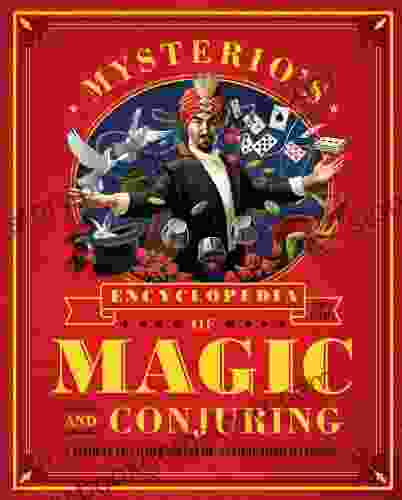
 Hamilton Bell
Hamilton BellMysterio Encyclopedia of Magic and Conjuring: A...
Mysterio Encyclopedia of...

 Zachary Cox
Zachary CoxAge of Expansion: Kurtherian Gambit, Valerie Elites - A...
: A Realm of Endless...

 Lawrence Bell
Lawrence BellA Short History of Falling: From Newton to Freefall
Falling is a...
4.6 out of 5
| Language | : | English |
| File size | : | 1292 KB |
| Text-to-Speech | : | Enabled |
| Screen Reader | : | Supported |
| Enhanced typesetting | : | Enabled |
| Word Wise | : | Enabled |
| Print length | : | 238 pages |


